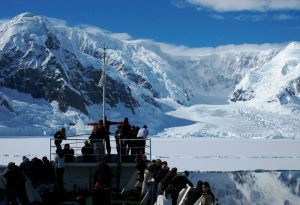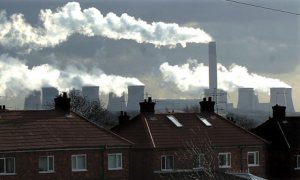Archive
January 5 Earthgauge radio podcast: Students on Ice Antarctic expedition and Sandra Steingraber

Click the audio player to listen to the latest edition of Earthgauge radio, which is a bi-weekly broadcast every other Thursday morning from 7-8 AM on CKCU 93.1 FM in Ottawa. You can also right click here to download the show.
On Earthgauge this week, we’re talking about environmental education and environmental health:
- Tony Dekker of the Great Lake Swimmers
- Geoff Green, founder of the environmental education organization Students on Ice
- Author, activist and cancer survivor Sandra Steingraber
First up, it’s snow, ice and the ends of the Earth. The environmental education organization Students on Ice has just departed on an Antarctic expedition with 60 high school students and an international team of scientists, educators, journalists, artists, leaders and polar experts. Among the participants is Tony Dekker, singer/songwriter for the Juno-nominated band Great Lake Swimmers.
I talked to Tony about his role on the expedition and why he wanted to take part. I also speak with Geoff Green, the SOI founder, about the work of his organization and what he hopes to achieve. This program, now in its tenth year, has taken over 1,800 students, teachers and scientists from around the world on expeditions to the Arctic and the Antarctic. The goal is to give the world’s youth a heightened understanding and respect for the planet’s global ecosystem, and the inspiration to protect it. Could part of the solution to the environmental crisis rest ultimately in better environmental education programs for our youth?
Finally, as this is the final show of 2011, I replay one of the most important interviews I did this year. It was with environmental health activist and cancer survivor Sandra Steingraber. Her message is one that all of us should hear.
Steingraber is an inspirational author, activist, poet, scientist and cancer survivor. She is an internationally recognized authority on the environmental links to cancer and human health who has been compared to the pioneering environmental health activist Rachel Carson. Steingraber’s most recent book is called Raising Elijah: Protecting Children in an Age of Environmental Crisis, which Naomi Wolf said “could be the most important and inspiring parenting book ever written.”
Steingraber writes weekly environmental essays for the Huffington Post and now a new documentary film has been produced based on her groundbreaking book, Living Downstream. She also contributed an article to a recent edition of Alternatives Journal called Coal, Oil and Cancer, in which she explains how fossil fuels are not only causing climate change, they are also causing cancer.
Please get in touch if you have any comments, suggestions or if you want to get involved or contribute to the show. Contact me at earthgaugeradio ‘at’ gmail.com.
I’ve seen the future and it is hemp: Earthgauge interview with Greg Herriott of Oilseed Works
 Click the audio player above to hear the interview I did with Greg Herriott for the Alternatives Journal podcast. Greg is the owner and founder of Oilseed Works. His company was honoured with a 2011 Hometown Hero award by Earth Day Canada and, in the interview, he talks about some of the amazing products he has created from hemp over the years.
Click the audio player above to hear the interview I did with Greg Herriott for the Alternatives Journal podcast. Greg is the owner and founder of Oilseed Works. His company was honoured with a 2011 Hometown Hero award by Earth Day Canada and, in the interview, he talks about some of the amazing products he has created from hemp over the years.
Given its many benefits, you have to wonder why hemp products are not more widespread. One can only suspect it may be due to outdated and misinformed notions of hemp’s association with a certain other plant. From healthy, nutritious foods to extremely strong hemp bale fibres to clothing to paper to renewable energy that can fuel vehicles and heat homes, hemp is truly a wonder plant. It is also one of the fastest growing plants we know of, producing up to 25 tonnes of dry matter per hectare per year. Hemp also requires few pesticides and no herbicides.
So why don’t we see more hemp products in our stores? Well, hemp is currently experiencing an explosion in interest but, in our interview, Greg explains some of the challenges he has had to overcome in getting his products to market and in getting widespread public acceptance of hemp. Not surprisingly, this has been especially difficult in the U.S., where the government does not always distinguish between the marijuana plant and the non-psychoactive Cannabis used for industrial hemp.
Right click here to download the interview.
Industrial pollution in Europe ‘costs billions each year’
A new report from the European Environment Agency confirms what we already know: air pollution from the burning of  fossil fuels brings enormous health and environmental costs. What is staggering, however, is the extent of these costs. In Europe alone, air pollution from the 10,000 largest polluting facilities in Europe cost citizens between € 102 and 169 billion in 2009. Half of the total damage cost (between € 51 and 85 billion) was caused by just 191 facilities.
fossil fuels brings enormous health and environmental costs. What is staggering, however, is the extent of these costs. In Europe alone, air pollution from the 10,000 largest polluting facilities in Europe cost citizens between € 102 and 169 billion in 2009. Half of the total damage cost (between € 51 and 85 billion) was caused by just 191 facilities.
When we hear about how clean energy cannot compete with the relatively low prices of oil, coal and gas without subsidies, remember that these health and environmental costs are not included in the prices that consumer pay. We simply pay for them later in health bills, premature deaths and environmental damages. If we paid the true cost of fossil fuels on society, there would be no contest. We would already be well on our way to a clean energy future.
You can read more about the report in this article from The Guardian.
Video interviews from Parliament Hill #tarsands protest September 26: George Poitras and Clayton Thomas-Muller

- Protesters arrested at Parliament Hill, Ottawa during the tar sands day of action
I attended the tar sands/Keystone XL protests in Ottawa on September 26 at which roughly 125 people were arrested. The protest was the embodiment of civil disobedience and was carried out in an extremely peaceful manner. Big thumbs up to the organizers and the hundreds who attended. Let’s hope this is the beginning of something.
During the protest, I had the opportunity to speak briefly with George Poitras, former Chief of the Mikisew Cree First Nation in northern Alberta and with Clayton Thomas-Muller who is a tar sands campaigner with the Indigenous Environmental Network, an activist for indigenous self-determination and environmental justice and a member of the Mathais Colomb Cree Nation (Pukatawagan) in Northern Manitoba. Check out the video links below.
Prenatal pesticide exposure tied to lower IQ in children
University of California – UC Newsroom | Prenatal pesticide exposure tied to lower IQ.
Interesting new study out of the University of California (Berkeley) showing that prenatal exposure to certain pesticides is related to lower intelligence scores at age 7. Not particularly surprising but the study gives yet more support to the growing body of research touting the significant benefits of organic foods over their chemically-grown counterparts. Here’s an excerpt from the article:
The researchers found that every tenfold increase in measures of organophosphates — widely used on food crops — detected during a mother’s pregnancy corresponded to a 5.5 point drop in overall IQ scores in the 7-year-olds. Children in the study with the highest levels of prenatal pesticide exposure scored seven points lower on a standardized measure of intelligence compared with children who had the lowest levels of exposure.
“These associations are substantial, especially when viewing this at a population-wide level,” said study principal investigator Brenda Eskenazi, UC Berkeley professor of epidemiology and of maternal and child health. “That difference could mean, on average, more kids being shifted into the lower end of the spectrum of learning, and more kids needing special services in school.”
Canada blocks UN asbestos ban
Oh the shame. Canada last week emerged as the only developed country to oppose the listing of chrysotile asbestos to the Rotterdam Convention, prompting a litany of criticism from around the world. If approved, the known carcinogen would have been listed on Annex III of the hazardous chemicals convention, which would require exporters to warn recipient countries of any health hazards. Putting us in fine company, Canada is one of only a handful of countries – including Kazakhstan, Kyrgyzstan, Ukraine, and Vietnam – that continue to export asbestos.
The World Health Organization has warned that “at least 90,000 people die each year from asbestos-related lung cancer, mesothelioma and asbestosis resulting from occupational exposures.” Doctors from Canada (including Quebec) and abroad have signed petitions, sent letters, organized delegations – all to no avail. It would seem Stephen Harper’s Conservative government is more concerned with protecting the asbestos industry in Canada (particularly Quebec) than with those pesky health hazards of chrysotile asbestos.
As Jeffrey Simpson points out in this recent article, the government “vigorously defends mining asbestos because of one little corner of Quebec, near Thetford Mines, where the asbestos is mined and shipped to developing countries, mostly in Asia. Stephen Harper’s top Quebec minister, Christian Paradis, used to head the Thetford Mines chamber of commerce. Mr. Harper campaigned in the area and supported the mining. He spent part of Friday, St. Jean Baptiste Day, in Thetford Mines, thereby reinforcing his government’s political marriage to asbestos.”
Bizarrely, the Montreal Gazette is reporting that the Canadian delegation to the summit agreed with the work of a United Nations scientific panel that wants to limit the export of chrysotile asbestos, but Canada still wouldn’t back the proposal. Billions of dollars will be spent to upgrade the Parliament Buildings in Ottawa in the coming years and one of the reasons for the repairs is the fact that they are full of asbestos, a cancer-causing substance that is no longer used in Canada. But for export to other countries? It seems we have no problem with that.
Indigenous perspectives on the Alberta tar sands

Click the audio player to hear the first in a series of special Earthgauge podcasts produced for CKUT radio.
The first episode looks at the tar sands of northern Alberta from the perspective of the people who are most directly affected by these massive industrial projects: namely, the First Nations communities living in the region. These are the communities of the Mikisew Cree First Nation, the Athabasca Chipewyan First Nation, Fort McMurray and Fort McKay First Nations and the Chipewyan Prairie First Nation.
For this podcast, I spoke with several individuals who are familiar with the impacts the tar sands projects are having on First Nations communities: Clayton Thomas-Muller of the Indigenous Environmental Network; Inuit activist and Nobel Peace Prize nominee Sheila Watt-Cloutier; Shannon Walsh, director of the documentary H2Oil; and Dr. John O’Connor, the former physician in the community of Fort Chipewyan.
What do these First Nations communities think of having the largest industrial development on Earth in their own backyard? Some are dependent on the jobs and income that the tar sands have created. Others are angry about the severe health and environmental impacts their communities have suffered. And now they want justice.
To download the podcast, right click here and select ‘Save as’ or ‘Save target as’.
Burning Water interview
Interview with Frederic Bohbot, producer of the new documentary film Burning Water

Click the audio player to hear my recent interview with the producer of the new documentary film, Burning Water. Directed by Cameron Esler and Tadzio Richards, Burning Water is about a family living in a small town in Alberta where an oil and gas boom is underway. Yet there’s a catch: their water can be lit on fire.
Canada’s largest natural gas company, Encana, has been drilling for coal bed methane in the area using a process called ‘fracking‘, which uses chemicals for drilling. Now methane is turning up in large quantities in the wells and the water supply of local farmers.
Is coal bed mining to blame? The Lauridsen family thinks so but the government of Alberta has other ideas. As other jurisdictions in North America consider their own oil and gas exploitation (such as shale gas drilling here in Quebec), Burning Water is a timely contribution to the debate. It serves as a cautionary tale that raises some very serious questions we all need to consider.
To download the interview, right click here and select ‘Save as’ or ‘Save target as’.
Mmmmm MEAT! Eeeeewww MEAT!
I know, I know…it sure tastes good. Juicy steaks, BBQ chicken, turkey dinners, ham sandwiches. Who can deny the  primal and sensual appeal of meat to many of us? But the problem seems to be that we’re just getting too darn much of a good thing…way too much. In fact, according to a recently published article in the Proceedings of the National Academy of Sciences, people will have to substantially cut meat from their diets if the world is to stay within safer limits of planet-warming greenhouse gases, nitrate pollution and habitat destruction.
primal and sensual appeal of meat to many of us? But the problem seems to be that we’re just getting too darn much of a good thing…way too much. In fact, according to a recently published article in the Proceedings of the National Academy of Sciences, people will have to substantially cut meat from their diets if the world is to stay within safer limits of planet-warming greenhouse gases, nitrate pollution and habitat destruction.
The fact is that the sustainability of current means of livestock production is seriously in doubt. The study finds that livestock production will consume a huge portion of the earth’s resources and account for high levels of pollution by 2050.
“We need to look at how much animal protein is needed in our diet,” said the report author Peter Tyedmers. “In Australia, in North America, in Europe, we consume a lot more animal protein than we need biologically.”
According to the Food and Agriculture Organization (FAO), humans are on track to eat 465 million tonnes of meat and consume more than 1 billion tonnes of milk in 2050, up from 229 million and 580 million tonnes respectively, in 2000. And according to PETA, every year in the U.S., more than 27 billion animals are slaughtered for food.
Wait a minute…did I read that correctly? 27 billion animals per year are killed for meat production in the U.S. alone? That’s the equivalent of roughly 74 million per day or 3 million deaths each and every hour. That statistic alone seems absolutely mind-boggling. And lets remember that, even when they are alive, most of these animals endure conditions in factory farms that would make us shudder with disgust.
Yet if all this weren’t enough, the Dalhousie study points out livestock production will account for 70% of greenhouse gas emissions by 2050, up from 52% in 2000. “We have to think about how we can change consumption patterns,” says Pelletier, “It doesn’t necessarily mean we stop producing livestock. I don’t think that’s realistic, but it’s equally unrealistic to expect that we can bring the entire planet up to the level of meat consumption of North Americans.”
Air pollution and breast cancer
A new study in the journal Environmental Health Perspectives has found that, in the city where I live –  Montreal, there seems to be a correlation between higher incidences of breast cancer in post-menopausal women and increases in local air pollution, specifically ambient concentrations of nitrogen dioxide which is a component of traffic-related pollution.
Montreal, there seems to be a correlation between higher incidences of breast cancer in post-menopausal women and increases in local air pollution, specifically ambient concentrations of nitrogen dioxide which is a component of traffic-related pollution.
Post-menopausal women living in the areas with the highest levels of pollution were almost twice as likely to develop breast cancer as those living in the least polluted areas. As reported by CBC News, the researchers “found around a 30 per cent increase in the risk of breast cancer for every increase of five parts per billion of this tracer gas, nitrogen dioxide,” said Goldberg, who is a clinical epidemiologist and professor of medicine at McGill.
This doesn’t sound like an awfully large increase to me – 5 parts per billion – but the study does not say how much exposure to exhaust would be considered dangerous. Nitrogen dioxide in itself doesn’t cause cancer; however, its presence is associated with other pollutants from vehicle emissions, some of which are known carcinogens.
None of this is entirely surprising as previous studies have also shown possible links between cancer and air pollution. [And if you think about it, doesn’t it just make sense? After all, we know with certainty that smoking causes cancer. Why would excessive exposure to toxic fumes somehow be different?] What is surprising is that we continue to cling to our fossil fuel-obsessed culture despite mounting evidence of the toll it is taking on our health and the environment. Montreal is not even a particularly bad case in terms of big cities with traffic congestion problems. Just imagine the toll that pollution must be taking on public health in places such as Beijing and Mexico City.
